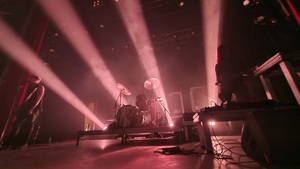“Snipes Headline”
Wesley Snipes
Michelle Harris
After what seems to be a perpetual wait (and I was worried because I was five minutes late), Wesley Snipes walks into a makeshift press room at the Shadow Lounge on South Beach. To my surprise, he is wearing the costume that his character wore in his new film, Blade. Although obviously very muscular and in great shape, he is not as imposing in person as you might think. He begins the press conference by telling the multitude of journalists vying for his attention (including myself) not to raise our hands for him to call on us, because this isn’t school. This matter being cleared up (of course, I would have preferred the hand raising thing to trying to speak over other reporters) the press conference is underway. The purpose of the conference is to promote Snipes’ new film Blade. Here is what he had to say about Blade and life in general.
• •
“Snipes”
What was it like to be a producer as well as actor in Blade?
It gives you the opportunity to have control over the final product. It makes a big difference, because you can see your vision in the final product. People come along and they either like it or they don’t like it, but you can truly take credit.
Were you familiar with the comic book character Blade before you took the role?
Not really, I only became familiar with it once they sent it to me.
I would like to talk about your martial arts training. What type of training did you have before the film, and what additional training, if any, did you need for the role?
I’ve been training since I was about twelve, but I didn’t have much opportunity to use a lot of it, and shoot it in a way that you could actually see what is going on. I’ve been training in a number of different styles, I started out in Japanese system and then moved into a Chinese system. I’ve been doing it for a long time. I just haven’t had a chance to display it and put it together in a format where it worked in the right context, not just Wes trying to do whatever for the sake of gimmick.
What form did you mostly use in the film itself?
It’s eclectic. I brought in everything. We’ve got some straight up jailhouse boxing that we threw in the movie, because Blade is a modern day warrior. He’s drawn from all the different disciplines, and whatever works, plus it’s set in a rather urban or modern-day city environment; we didn’t only want to make it just Chinese systems or stuff like that. That would make it a style that is very hard to adapt to American filmmaking, and even harder for the audience to accept. We didn’t want to make it just a samurai movie. We had scenes where I was hitting cats with bottles and garbage cans and everything else. It’s like whatever goes.
Was the sword work in the film part of your martial arts training, or was it something you learned specifically for the film?
That was part of the training, but we definitely amped it up. For one, we didn’t want anyone to get hurt. We started out with a wooden sword at first. I stabbed one of the cats in the leg a couple times, he forgave me, though, later on.
Your production company, Amon Ra Films, is named after an ancient Egyptian god. How did that name come about?
I’ve been a student of the ancient mysteries and classical African societies for almost eighteen years now, so in looking for a name that could embody some type of strong spiritual energy, I choose Amon Ra, meaning the unseen source of all creation. I felt like the greatest things that are just as real but unseen are ideas.
One of the producers, Peter Frankfurt, said Blade wasn’t a vampire film. What do you think Blade is about?
There is no profound social commentary, it actually is more reflective of a lifestyle, like the daywalkers and the nightstalkers. The people who have split personalities. They’re not just the X generation, they’re not buppies, yuppies, or anything like that. They function on the realm of immortality, the ideology of that. They can do all of the socially accepted things, but at night they do whatever the hell they want to do.
There are a lot of actors normally associated with drama, such as Nicholas Cage, now doing action flicks. What do you think the attraction is?
They know they can get paid. That’s where the paper is. Plus, some films, comedies, horror films, some suspense translate into action films, and that broadens your base.
Out of all the characters you’ve played, which one is most like the real Wesley Snipes?
I don’t know, they’ve all had a little bit of me in them. I think White Men Can’t Jump is probably the closest to my real personality. All the other stuff is just exaggerated elements.
Is there any character you haven’t played that you would like to?
I still would like to do the Miles Davis story. ◼












